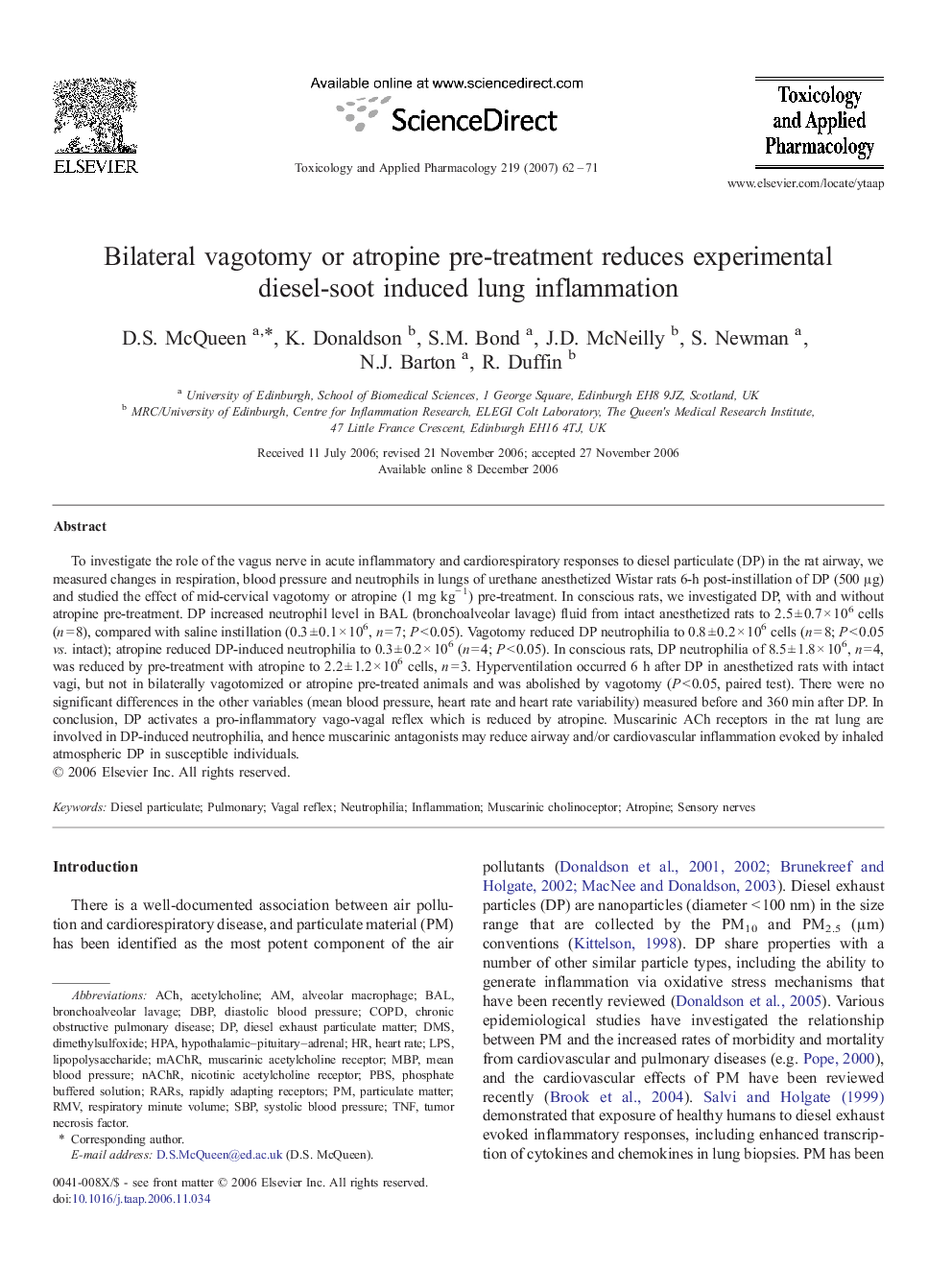| Article ID | Journal | Published Year | Pages | File Type |
|---|---|---|---|---|
| 2571833 | Toxicology and Applied Pharmacology | 2007 | 10 Pages |
Abstract
To investigate the role of the vagus nerve in acute inflammatory and cardiorespiratory responses to diesel particulate (DP) in the rat airway, we measured changes in respiration, blood pressure and neutrophils in lungs of urethane anesthetized Wistar rats 6-h post-instillation of DP (500 μg) and studied the effect of mid-cervical vagotomy or atropine (1 mg kgâ 1) pre-treatment. In conscious rats, we investigated DP, with and without atropine pre-treatment. DP increased neutrophil level in BAL (bronchoalveolar lavage) fluid from intact anesthetized rats to 2.5 ± 0.7 Ã 106 cells (n = 8), compared with saline instillation (0.3 ± 0.1 Ã 106, n = 7; P < 0.05). Vagotomy reduced DP neutrophilia to 0.8 ± 0.2 Ã 106 cells (n = 8; P < 0.05 vs. intact); atropine reduced DP-induced neutrophilia to 0.3 ± 0.2 Ã 106 (n = 4; P < 0.05). In conscious rats, DP neutrophilia of 8.5 ± 1.8 Ã 106, n = 4, was reduced by pre-treatment with atropine to 2.2 ± 1.2 Ã 106 cells, n = 3. Hyperventilation occurred 6 h after DP in anesthetized rats with intact vagi, but not in bilaterally vagotomized or atropine pre-treated animals and was abolished by vagotomy (P < 0.05, paired test). There were no significant differences in the other variables (mean blood pressure, heart rate and heart rate variability) measured before and 360 min after DP. In conclusion, DP activates a pro-inflammatory vago-vagal reflex which is reduced by atropine. Muscarinic ACh receptors in the rat lung are involved in DP-induced neutrophilia, and hence muscarinic antagonists may reduce airway and/or cardiovascular inflammation evoked by inhaled atmospheric DP in susceptible individuals.
Keywords
BALRMVTNFMuscarinic cholinoceptorPBSnAChRmAChRDMSMBPLPSDBPSBPRARsAtropineAChAcetylcholineSensory nervesinflammationCOPDChronic obstructive pulmonary diseaseDimethylsulfoxideDiesel particulateparticulate mattervagal reflexPulmonaryHeart ratetumor necrosis factor.diastolic blood pressuresystolic blood pressuremean blood pressurebronchoalveolar lavagelipopolysaccharideAlveolar macrophagephosphate buffered solutionHPANeutrophiliahypothalamic–pituitary–adrenalmuscarinic acetylcholine receptornicotinic acetylcholine receptorRapidly adapting receptors
Related Topics
Life Sciences
Environmental Science
Health, Toxicology and Mutagenesis
Authors
D.S. McQueen, K. Donaldson, S.M. Bond, J.D. McNeilly, S. Newman, N.J. Barton, R. Duffin,
